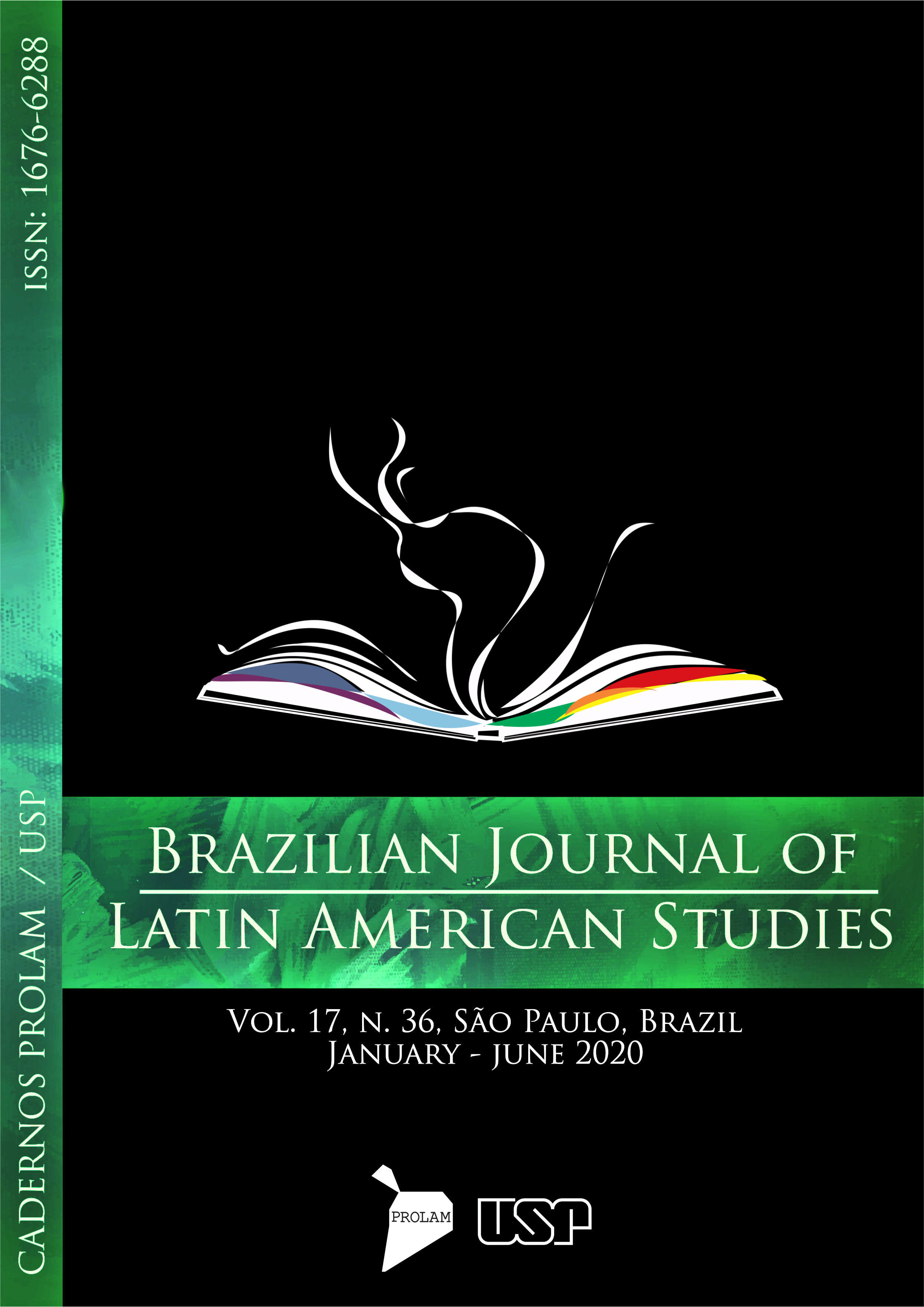Perspectives from the Global South
an analysis of the common cycle of studies of the Unila
DOI:
https://doi.org/10.11606/issn.1676-6288.prolam.2020.167981Keywords:
Curriculum, Internationalization, Latin America, Counter-hegemony, UNILAAbstract
The aim of this article is to study the curriculum of the Common Cycle of Studies of the Federal University of Latin American Integration (UNILA) based on a critical-emancipatory perspective. By basing on the proposal of the University to focus on a Latin American and Caribbean integration, as well as to offer a pedagogical proposal fostered by the enunciation of knowledge that was historically marginalized by the eurocentric culture, the research intends to articulate such idea to a proposal of internationalization of the higher education thereafter, from a counterhegemonic and decolonial approach of this process. The curriculum analysis of the Common Cycle of Studies aims to demonstrate how this curriculum was conceived, taking into consideration the Latin American identity concern, as well as the academic internationalization based on the terms of cooperation, integration and solidarity.
Downloads
References
APPLE, M. W. Ideologia e currículo. 3. ed. Porto Alegre: Artmed, 2006.
BRASIL. Projeto de Lei nº 2.878/2007. Disponível em: portal.unila.edu.br/institucional/documentos-oficiais/estatuto-da-unila. Acesso em: 19 dez. 2019.
CANDAU, V. Interculturalizar, descolonizar, democratizar: uma educação “outra”? Rio de Janeiro: 7 Letras, 2016.
CANDAU, V.; OLIVEIRA, L. F. Pedagogia decolonial e educação antirracista no Brasil. In: CANDAU, V. M. Diferenças culturais e educação: construindo caminhos. Rio de Janeiro: 7 Letras, 2011.
CARVALHO, S. C. Políticas linguísticas e integração latino-americana: desafios de uma proposta bilíngue para o ensino superior. Revista Digital do Instituto Latino-Americano de Arte, Cultura e História – UNILA, v. 11, p. 1-29, 2018. Disponível em: https://revistas.unila.edu.br/sures/article/view/1022. Acesso em: 05 fev. 2020.
CONSELHO DA EUROPA. Quadro comum europeu de referência para as línguas: aprendizagem, ensino, avaliação. Edição portuguesa. Porto: Edições Asa, 2001. Disponível em: http://area.dge.mec.pt/gramatica/Quadro_Europeu_total.pdf. Acesso em: 24 abr. 2020.
HALL, S. A identidade cultural na pós-modernidade. 9. ed. Rio de Janeiro: DP&A, 2004.
HAMEL, Rainer Enrique. Las políticas lingüísticas en el Mercosur: ¿una barrera frente a la globalización del inglés?. In: Languages in a Globalising. World. Maurais, Jacques & Morris, Michael A. (eds.). Cambridge: Cambridge University Press, 2003. p. 1-22. Disponível em: http://www.hamel.com.mx/ArchivosPDF/Work%20in%20Progress/2003%20Mercosur.pdf. Acesso em 25 fev. 2020.
IMEA (INSTITUTO MERCOSUL DE ESTUDOS AVANÇADOS. UNILA em construção: um projeto universitário para a América Latina. Foz do Iguaçu, Publicações, 2009b.
MALDONADO-TORRES, N. Sobre la colonialidad del ser: contribuciones al desarrollo de un concepto. In: CASTRO-GÓMEZ, S.; GROSFOGUEL, R. (Orgs.) El giro decolonial. Reflexiones para una diversidad epistémica más allá del capitalismo global. Bogotá: Universidad Javeriana-Instituto Pensar, Universidad Central-IESCO, Siglo del Hombre Editores, 2007.
MIGNOLO, W. D. Colonialidade: o lado mais escuro da modernidade. Revista Brasileira de Ciências Sociais, v. 32, p. 2-13, 2016. Disponível em: https://doi.org/10.17666/329402/2017. Acesso em: 14 fev. 2020.
PEREIRA, E. M. A. A construção do conhecimento na modernidade e na pós-modernidade: implicações para a universidade. Revista Ensino Superior da Unicamp, n. 14, s/p, 2014. Disponível em: http://repositorio.unicamp.br/jspui/handle/REPOSIP/119465. Acesso em: 10 fev. 2020.
QUIJANO, A. Colonialidad del poder, eurocentrismo y América Latina. In: LANDER, E. (Org.). La colonialidad del saber: eurocentrismo y ciencias sociales. Perspectivas Latinoamericanas. Buenos Aires: Clacso, 2008.
RIBEIRO, D. A América Latina existe? Brasília: Editora UNB, 2010.
SANTOS, B. S. O fim do império cognitivo: a afirmação das epistemologias do Sul. São Paulo: Autêntica, 2019.
SILVA, T. T. Documentos de identidade: uma introdução às teorias de currículo. São Paulo: Editora Autêntica, 2010.
SINGER, P. One World: The Ethics of Globalization. New Haven & London: Yale University, 2002.
TRASPADINI, R. S.; SILVA, L. A. A UNILA e a integração: miragem latina, horizonte neoliberal ou disputas contínuas? Revista Teias, v. 20, p. 97, 2019. Disponível em: https://doi.org/10.12957/teias.2019.39723. Acesso em: 02 fev. 2020.
UNILA. Regimento Geral da Universidade. Foz do Iguaçu, 2013a. 50 p. Disponível em: https://portal.unila.edu.br/institucional/documentos-oficiais/regimento-geral-da-unila/view. Acesso em: 12 de fev. 2020.
UNILA. Projeto pedagógico: Ciclo Comum de Estudos. Foz do Iguaçu, 2013b. Disponível em: https://unila.edu.br/sites/default/files/files/PPC2%20do%20CICLO%20COMUM.pdf. Acesso em: 14 de fev. de 2020.
Downloads
Published
Issue
Section
License
A BJLAS adota a política de Acesso Livre (Libre Open Access), sob o acordo padrão Creative Commons (CC BY-NC 4.0). O acordo prevê que:
- A submissão de texto autoriza sua publicação e implica compromisso de que o mesmo material não esteja sendo submetido a outro periódico. O original é considerado definitivo;
- Autores mantêm os direitos autorais e concedem à revista o direito de primeira publicação, com o trabalho simultaneamente licenciado sob a Licença Creative Commons Attribution (CC BY-NC 4.0).
- Autores têm autorização para assumir contratos adicionais separadamente, para distribuição não-exclusiva da versão do trabalho publicada nesta revista (ex.: publicar em repositório institucional ou como capítulo de livro), com necessário reconhecimento de autoria e publicação inicial nesta revista;
- Autores têm permissão e são estimulados a publicar e distribuir seu trabalho online (ex.: em repositórios institucionais, repositórios específicos, ou na sua página pessoal) após o processo editorial, já que isso pode gerar alterações produtivas, bem como aumentar o impacto e a citação do trabalho publicado (Veja O Efeito do Acesso Livre).
- O detentor dos direitos autorais da revista, exceto os já acordados no acordo sob a Licença Creative Commons Attribution (CC BY-NC 4.0), é o Programa de Pós-graduação Integração da América Latina.
É permitida a cópia, reprodução e distribuição de textos, imagens, dados e demais arquivos, no todo ou em parte, em qualquer formato ou meio, desde que sejam observadas as regras da licença Creative Commons (CC BY-NC 4.0):
- O uso do material copiado e ou reproduzido no todo ou em partes deve se destinar apenas a fins educacionais, de pesquisa, uso pessoal ou outros usos não comerciais. Reproduções para fins comerciais são proibidas;
- O material pode ser copiado e redistribuído em qualquer suporte ou formato;
- A reprodução deverá ser acompanhada da citação da fonte na integra incluindo o(s) nome(s) do(s) aturoes(s), no seguinte formato: Fonte: Revista Cadernos Prolam/USP. Brazilian Journal of Latin American Studies;
- Os nomes e endereços informados na revista serão usados exclusivamente para os serviços prestados por esta publicação, não sendo disponibilizados para outras finalidades ou a terceiros.




